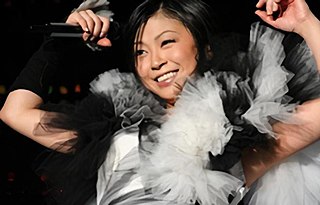
Hikaru Utada, also known by the mononym Utada, is an American and Japanese singer, songwriter and producer. Utada is one of the most influential, bestselling musical artists in Japan.

"First Love" is a song by the Japanese-American singer-songwriter Hikaru Utada. It was released on April 28, 1999, as the third Japanese language single from her second studio album, First Love, which was issued a month previously. It was certified double platinum for 800,000 copies shipped to stores in Japan.

Ultra Blue is the sixth album by Japanese–American singer Hikaru Utada, released on June 14, 2006, by EMI Music Japan. It is the first original Japanese language album under Hikaru Utada's name in four years since her third album Deep River (2002). Ultra Blue contains thirteen songs, including six singles released between 2003 and 2006. While the arrangements for her album Deep River were done collaboratively, all but one of the songs on Ultra Blue were written, composed, and arranged solely by Utada, who also did the programming herself. In this album, the R&B elements that have been present since her debut are further diminished, and the majority of the songs have an electronic flavor with an emphasis on synth sounds.
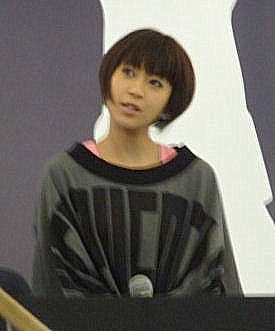
The discography of Japanese-American R&B and pop singer Hikaru Utada consists of eleven studio albums, four compilation albums, eleven video albums and numerous singles and promotional singles. Utada began as a musician in the early 1990s as a member of U3, a family unit made up of her, her mother Junko Utada, also known as 1970s enka singer Keiko Fuji, and her father, musical producer Teruzane Utada. U3 released their debut album Star in 1993, with the hope to debut in America. In 1996, the group was rebranded as Cubic U, an R&B project focusing on Hikaru Utada, resulting in the English language album Precious in 1998 with record label Toshiba EMI.

"Flavor of Life" is Hikaru Utada's 18th Japanese single. The physical single was officially released on February 28, 2007.

"Beautiful World" is a song by Japanese American musician Hikaru Utada. It served as the theme song for Evangelion: 1.0 You Are (Not) Alone, the 2007 film reboot of the anime Neon Genesis Evangelion. It was released as a double A-side single on August 29, 2007 along with her song "Kiss & Cry", which had been released digitally three months earlier. In 2009, a remix of the song, "Beautiful World " served as the theme song of the second film in the series, Evangelion: 2.0 You Can (Not) Advance.

"Heart Station" is a song by Japanese musician Hikaru Utada, which was released as a double A-side single alongside her song "Stay Gold" on February 20, 2008. It served as the fifth single from her fifth Japanese-language album Heart Station. "Heart Station" was fully written, composed and produced by Utada herself. The song was created with the image of a song that would come on if you were to turn on your car radio on a late-night highway on your way home from work or play, with the title meaning a place that transmits radio waves from the heart. Musically, it is a midtempo pop ballad. Lyrically, it speaks about bidding someone adieu and still trying to reach them and maintain their presence in your life.
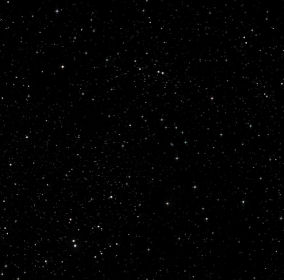
Utada Hikaru Single Collection Vol. 2 is Japanese pop singer-songwriter Hikaru Utada's second compilation album, released on November 24, 2010, by EMI Music Japan, the same day as her Universal-released English language compilation album, Utada the Best. The album includes two discs, with the first being a 13-track greatest hits album spanning 2004–2009, while the second is an extended play featuring new material. Along with Utada the Best, this remained Utada's last album release for six years, until 2016's Fantôme, due to an announced hiatus. Several of the new songs achieved commercial success, with "Goodbye Happiness" reaching number one on Billboard's Japan Hot 100 chart, and "Can't Wait 'Til Christmas" reaching number one on the Recording Industry Association of Japan's digital track chart. Both songs have been certified by the association as gold records for full-length cellphone downloads.
"Can't Wait 'Til Christmas" is a song by Japanese singer-songwriter Hikaru Utada. It was released on Utada's second Japanese compilation album, Utada Hikaru Single Collection Vol. 2, on November 24, 2010.

"Sakura Nagashi" is a song by Japanese singer-songwriter Hikaru Utada. It was released by EMI Music Japan digitally on November 17, 2012, with a DVD single released December 26, 2012. The song is the theme to the third film of the Rebuild of Evangelion movie series, Evangelion: 3.0 You Can (Not) Redo, and was later included on their sixth Japanese-language studio album Fantôme, released in 2016. The single also marked Utada's last release under the then EMI-controlled EMI Music Japan as the label was absorbed into Universal Music Japan as EMI Records Japan in April 2013.

"Sakura Drops" is a song by Japanese-American musician Hikaru Utada. It was released as a double A-side single with the song "Letters" on May 9, 2002.

"Stay Gold" is a pop song by Japanese American musician Hikaru Utada. Used in a high-profile campaign for Kao Corporation's Asience shampoo commercials in 2007, the song was released as a double A-side single with Utada's song "Heart Station" on February 20, 2008.

Fantôme is the sixth Japanese studio album by Japanese-American singer-songwriter Hikaru Utada. Although Utada announced an indefinite hiatus from the public eye in August 2010, she continued writing and composing material with her father, Utada Teruzane, and long-term collaborator, Miyake Akira. Musically, Fantôme contains a collection of tracks that utilizes acoustic and stripped-down instrumentations, alongside influences of pop, electronic, and R&B music. The lyrical content delves into themes of grief, sadness, love, and death—mostly influenced by the death of her mother, her second marriage, and the birth of her son in 2015.
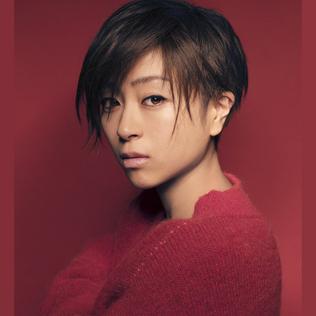
"Anata" is a song by Japanese-American singer-songwriter Hikaru Utada. It is their third single under the label Epic Records Japan, from their seventh Japanese-language studio album Hatsukoi. The song was used as a tie-in for movie Destiny: The Tale of Kamakura, and was released as a digital download on December 8. The song is their first movie tie-in in 5 years, since "Sakura Nagashi" was released in 2012 for Evangelion: 3.0 You Can (Not) Redo. The song was written with a Buddhist's view to show both the real and fantasy mixed world shown in the movie. Besides the movie, the song is also featured in a Sony campaign to promote a wireless headphone line, in which they themself also appears.
"Chikai" is a song by Japanese American singer-songwriter Hikaru Utada. Along with its English-language counterpart "Don't Think Twice", it serves as the ending theme song to the Square Enix video game, Kingdom Hearts III. "Chikai" first appeared on Utada's seventh Japanese-language studio album, Hatsukoi, and was also included on the setlist of their Laughter In The Dark Tour.
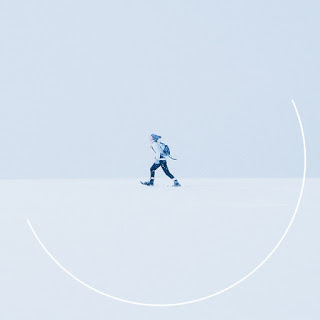
"Play a Love Song" is a song by Japanese-American singer-songwriter Hikaru Utada. It is her fourth single under the label Epic Records Japan, from her seventh Japanese-language studio album Hatsukoi. The song was released as a digital download on April 25, 2018 and was being used as a tie-in for Tennensui Suntory Water.

Hatsukoi is the seventh Japanese-language studio album by Japanese–American recording artist Hikaru Utada. It was released on June 27, 2018, as her first album under Sony Music Japan sublabel Epic Records Japan. The release coincided with the commemoration of her 20th Anniversary as an artist in Japan. A national tour was announced to support the album in November 2018. The five previously released songs were confirmed in the album track list, for a total of twelve songs, including the title track "Hatsukoi" and the Kingdom Hearts III theme song "Chikai".

Hikaru Utada Laughter in the Dark Tour 2018 was Japanese-American singer-songwriter Hikaru Utada's fourth Japanese tour. The 13-date sold-out tour began in Yokohama and ended in Chiba. It was Utada's first concert in Japan in 8 years since Wild Life, and first concert tour in the country in 12 years since Utada United 2006. Initially, the concert tour was scheduled with 12 regular dates in arenas, but one extra concert, sponsored by Suntory, was later scheduled for November 17.

"Time" is a song by Japanese-American singer-songwriter Hikaru Utada, released on May 8, 2020, by Epic Records Japan. It served as the theme song for the NTV drama Bishoku Tantei Akechi Goro. The song was certified Gold by RIAJ for selling more than 100,000 digital downloads in Japan.

Science Fiction is the first greatest hits album and fourth overall compilation album by Japanese-American singer-songwriter Hikaru Utada, released on April 10, 2024, through Epic Records Japan and USM Japan. Commemorated the 25th anniversary of their career, the album consists of two discs with 26 tracks, including new mixing and re-recording of their previous singles and three original tracks "Gold ", "Naniiro Demo Nai Hana", and "Electricity". In support of the album, Utada will embark on the Science Fiction Tour in 2024.
















